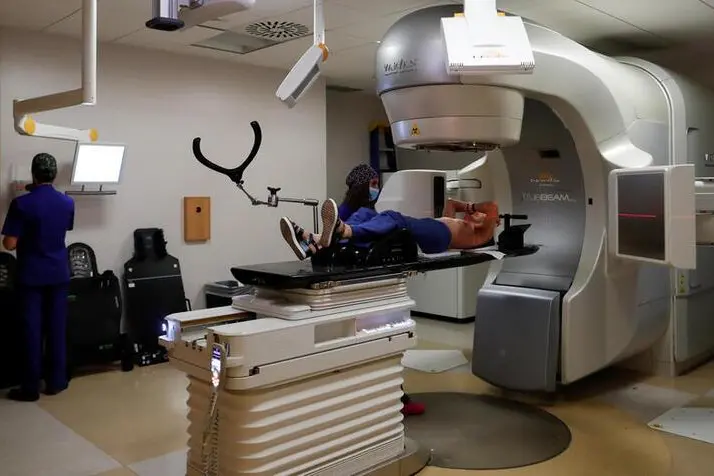PHOTO
A 10-year follow-up analysis of the Age-Related Eye Disease Study 2 (AREDS2) confirms the benefit of replacing beta carotene with lutein/zeaxanthin in the supplement used to slow age-related macular degeneration (AMD), while reducing the beta carotene-associated lung cancer risk.
The original AREDS study showed that a dietary supplement formulation (500 mg vitamin C, 400 international units vitamin E, 2 mg copper, 80 mg zinc, and 15 mg beta carotene) could significantly slow the progression of AMD (https://bit.ly/3xr5sTy) from moderate to late disease. However, two other studies showed that people who smoked and took beta carotene had a significantly higher than expected risk of lung cancer.
"From 2006 to 2012, the AREDS2 randomized clinical trial evaluated the addition of lutein and zeaxanthin (compared to beta carotene) to the AREDS supplement," Dr. Emily Chew of the US National Eye Institute in Bethesda told Reuters Health by email. "After a mean follow-up of five years, those randomized to beta carotene almost doubled the rate of developing lung cancer, particularly patients who were former cigarette smokers."
"With additional follow-up of five years at the end of that clinical trial, when all the participants were given the AREDS2 supplement containing lutein and zeaxanthin, we were somewhat surprised to see that there was still an increased risk of lung cancer in participants who were originally randomized to beta carotene," she said. "This occurred despite having stopped giving the beta-carotene in the last five years of the 10-year follow-up. There was no increased risk of developing lung cancer with lutein and zeaxanthin."
As reported in JAMA Ophthalmology, Dr. Chew and colleagues conducted a multicenter epidemiologic follow-up study of the AREDS2 clinical trial, which had compared lutein/zeaxanthin and/or omega-3 fatty acids or placebo and, secondarily, no beta carotene versus beta carotene and low versus high doses of zinc.
The current five-year follow-up study included 3,882 of the original participants (mean baseline age, 72; 58%, women) and 6,351 eyes; all participants had bilateral or unilateral intermediate AMD.
As Dr. Chew noted, all participants received AREDS2 supplements with lutein/zeaxanthin (no beta carotene), as well as the other ingredients. The main outcomes were self-reported lung cancer and late AMD, assessed at six-month phone calls.
At 10 years after the start of the original trial, the odds ratio of having lung cancer was 1.82 for those who had been randomly assigned to beta carotene in that trial and 1.15 for those assigned to lutein/zeaxanthin.
The hazard ratio for progression to late AMD comparing lutein/zeaxanthin with no lutein/zeaxanthin was 0.91, and comparing omega-3 fatty acids with no omega-3 fatty acids, 1.01.
When the lutein/zeaxanthin main effects analysis was restricted to those randomly assigned to beta carotene, the HR was 0.80.
A direct analysis of lutein/zeaxanthin versus beta carotene showed the HR for late AMD was 0.85.
In addition, the HRs were both 1.04 for low versus high zinc and for no beta carotene versus beta carotene.
Dr. Chew said, "We were delighted to see that lutein and zeaxanthin maintained a competitive edge over beta carotene. The decision to replace beta carotene was deemed appropriate."
Dr. Avni Finn, Assistant Professor of Ophthalmology and Visual Sciences at the Vanderbilt Eye Institute in Nashville, commented on the study in an email to Reuters Health. "As with any study, there are limitations to both the original AREDS2 study and this extension study," she said.
"Many of the outcomes assessed in this extension study were self-reported," she noted. "Due to the lack of ophthalmic exam or images, discerning which subtype of late AMD - wet AMD or geographic atrophy - was not possible."
"Additionally, ...the patient population was not as diverse as the general population and so there may be limitations in the generalizability of the findings," she said. "Lastly, even the placebo group...was offered the AREDS2 supplement in the extension study, rather than a true placebo supplement."
"While the AREDS2 vitamins may slow the progression of late AMD," she said, "there was only a relative 25% benefit of reducing (that) risk of progression. There is much more work to be done to decrease risk or slow the progression to the end stages of AMD, which includes wet AMD or geographic atrophy."
Reuters




















